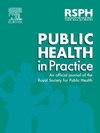Short Communication: What interest and influence do Directors of Public Health in London have in local gambling policy?
IF 1.9
Q2 PUBLIC, ENVIRONMENTAL & OCCUPATIONAL HEALTH
引用次数: 0
Abstract
Objectives
Gambling harms are increasingly conceptualised as a public health issue, affecting not only the individual who gambles but those close to them and to wider society too. However, the Gambling Act 2005 gives public health teams no statutory role in decisions by local councils on ‘land-based’ gambling licensure, unlike alcohol premises licensing where public health teams are a responsible authority. We surveyed Directors of Public Health in London to gain understanding of their interest and influence in local gambling policy.
Study design
a survey was created in conjunction with representatives from London public health teams and disseminated via an online platform. It was sent to Directors of Public Health in all 32 London boroughs.
Methods
Survey questions were a mixture of fact-finding questions about the public health teams structure (including staff number) and Likert scale questions about their interest and influence in gambling policy, using comparator questions with alcohol policy (where public health teams have a formal role).
Results
the response rate for the survey was 28 %. The place of public health teams within individual councils varies widely, as does the number of Full-Time Equivalent staff members. There was positive correlation between a public health teams perceived influence on alcohol and gambling policy. Public health teams identified a wide number of existing effective partnerships within their organisations.
Conclusions
The findings suggest that it is public health team integration rather than pure legislative factors that influence their involvement in local gambling policy. Existing effective partnerships, particularly licensing and planning, should be harnessed to further integrate public health teams into decision-making.
简短交流:伦敦公共卫生主管对当地赌博政策有什么兴趣和影响?
赌博危害越来越被视为一个公共健康问题,不仅影响到赌博的个人,也影响到与他们亲近的人以及更广泛的社会。然而,2005年《赌博法》没有赋予公共卫生小组在地方议会关于“陆上”赌博许可证的决定中发挥法定作用,这与公共卫生小组是负责当局的酒精场所许可证不同。我们调查了伦敦的公共卫生主管,以了解他们对当地赌博政策的兴趣和影响。研究设计调查是与伦敦公共卫生团队的代表一起创建的,并通过在线平台传播。它被送到伦敦所有32个行政区的公共卫生主管那里。方法调查问题是关于公共卫生团队结构(包括工作人员数量)的事实调查问题和关于他们对赌博政策的兴趣和影响的李克特量表问题的混合,使用与酒精政策(公共卫生团队具有正式作用)比较的问题。结果本次调查的回复率为28%。公共卫生小组在各个理事会的位置差别很大,相当于全职工作人员的人数也差别很大。公共卫生团队对酒精和赌博政策的感知影响之间存在正相关关系。公共卫生小组在其组织内确定了大量现有的有效伙伴关系。结论公共卫生团队的整合而非纯粹的立法因素影响了他们对地方赌博政策的参与。应利用现有的有效伙伴关系,特别是许可和规划,使公共卫生小组进一步参与决策。
本文章由计算机程序翻译,如有差异,请以英文原文为准。
求助全文
约1分钟内获得全文
求助全文

 求助内容:
求助内容: 应助结果提醒方式:
应助结果提醒方式:


